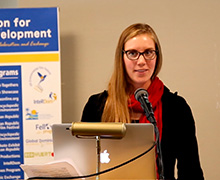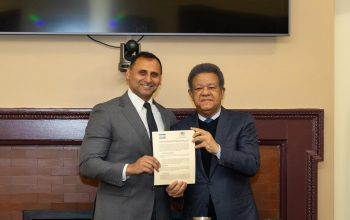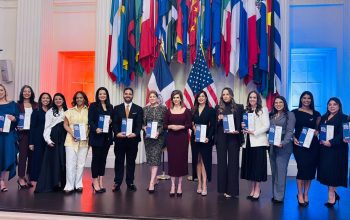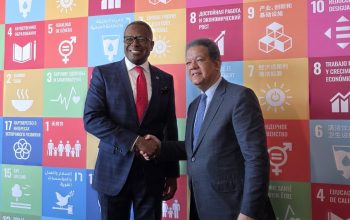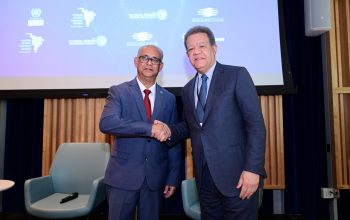news
“The Key to Resilience is Adaptive Capacity” States GFDD Fellow Hilary Lohmann
October 1, 2015
Seeking to highlight the vulnerability of Small Island Developing States such as the Dominican Republic to the impacts of climate change on its coastal communities and resources, GFDD/Funglode put together a special UN side event on Thursday October 1 that joined policy experts with one of the authors of Climate Change in the Dominican Republic: Impact on Coastal Resources and Communities for an engaged debate on the topic of climate change adaptation
policies.
To celebrate the release of its latest publication series Research and Ideas entitled Climate Change in the Dominican Republic: Impact on Coastal Resources and Communities, the Global Foundation for Democracy and Development (GFDD) and its sister organization Fundación Global Democracia y Desarollo (Funglode) hosted GFDD Fellow Hilary Lohmann for a special presentation of her work at the UN Church Center on October 1. The
presentation was followed by a panel discussion with policy experts including Dr. Ruben Torres, founder and president of Reef Check Dominican Republic, and Karen Kent, Senio Coastal Resources Manager at the Rhode Island University Coastal Resources Center.
The panel, received further marketing support thanks to the sponsorship of UNA USA Council of Organizations, the NGO Committees on Sustainable Development and Financing for Development and the Conference on NGOs in
Consultative Relationship with the United Nations, Reef Check DR and Rhode Island University Coastal Resources Center.
Yamile Eusebio, Director of GFDD’s New York Office, welcomed the attendees before stressing the importance of the work of Hilary Lohmann as a GFDD Fellow, for the purposes of policy making and the sustainable development of the Dominican Republic. Eusebio announced to the audience the upcoming presentation in Santo Domingo on October 7, 2015 at
Funglode Headquarters and invited them to attend.
Marc Jourdan, GFDD UN Representative introduced the panelists and moderated the panel discussion focusing on the impact of climate adaptation policies in Small Island Developing States (SIDS).
Lohman explained that “the impacts of climate change contribute to instability around the world”. She stressed that the “key to resilience [to the impacts of climate change] is adaptive capacity”. Highlighting some of the findings in her study she noted that “communities are often integrated systems, composed of individuals that are dependent on natural resources”. She explained that the reliance of these individuals
on these natural resources can have various reasons be it “for nutrition, for income, or for safety (e.g. reefs and mangroves reduce storm surge impacts to a coastline), but also simply for a functional integrated community”. She concluded her intervention by calling for “policies and programs that include many different parts of a community, as they are all interrelated and interdependent when viewed through a wider lens”.
Dr.
Torres spoke about the ecological aspects of coastal resources and the importance of coral reefs for the Dominican Republic. He emphasized that coral reefs are “provide the habitat for many marine species that humans use as food source or for marine tourism recreation”. He also noted their gradual decline over time as “50% of all corals in the Dominican Republic have declined in number since 1970”. Praising Lohmann for the findings of her study
related to the social implications of climate change in the Dominican coastal communities, he impressed on the audience that “In order to build up resilience against climate change in Caribbean coral reefs, local stressors such as coastal development, over fishing, and pollution must be addressed first.” Inviting the audience to do their part he informed of the opportunity to adopt a coral and provide funding for their restoration in the Dominican Republic.
Kent took the floor to highlight the relevance of Lohmann’s work and discuss some of the initiatives and projects conducted by the Coastal Resources Center. Informing the attendees that her staff is a mix of “social scientists, ocean researchers, economists, engineers, and marine spatial planners” she explained that they “apply best practices in social and exact sciences to real-life coastal challenges”. Touching on the issue of
global warming, ocean acidification and their impact on coral reefs she said that “what happens in the pacific also affects what is going in the Caribbean” and therefore pointed to the interconnectedness of climate issues and the need for greater collaboration at the international level.
Thanking the panelist for their remarks, Jourdan opened the floor to questions from the audience. The panelists fielded a variety of questions from attendees ranging
from the impact of coral bleaching on the tourism industry, to discussing options for adapting to sea level rise through land fill reclamation projects.
Jourdan concluded the session by thanking the audience, the panelists and the sponsors for their support, and encouraging the attendees to remain engaged in the events and initiatives of GFDD/Funglode and attend the following presentations of the publication on October 7 at Funglode in Santo Domingo and on October 29 at
University of Rhode Island.
About the Fellows Program
The Fellows Program, an extension of the internship and academic exchange program InteRDom, was developed in 2009 to respond to the desire of GFDD and Funglode to develop a community of scholars that contributes to the Foundations’ growing body of research on matters of international concern that directly impact the Dominican Republic.
The Program complements
the overall mission of GFDD and Funglode to promote academic exchange, generate scholarship, and influence the creation of public policy related to economic and social development both at the national and international levels.
Through the Fellows Program, GFDD and Funglode seek to generate scholarship on issues at the forefront of the United Nations’ agenda in order to give voice to national and regional concerns and offer viable solutions to domestic and
international challenges.

